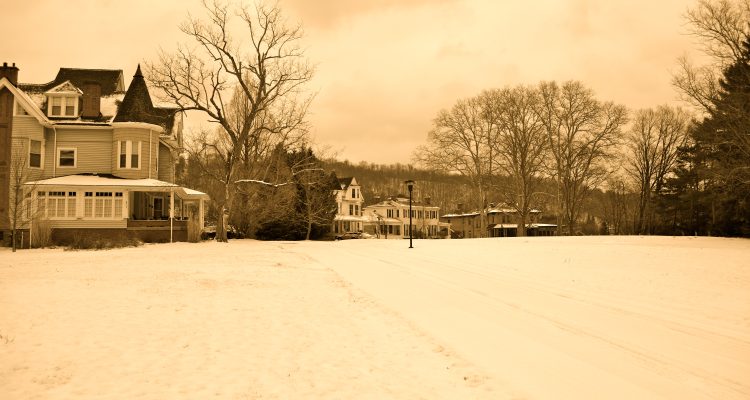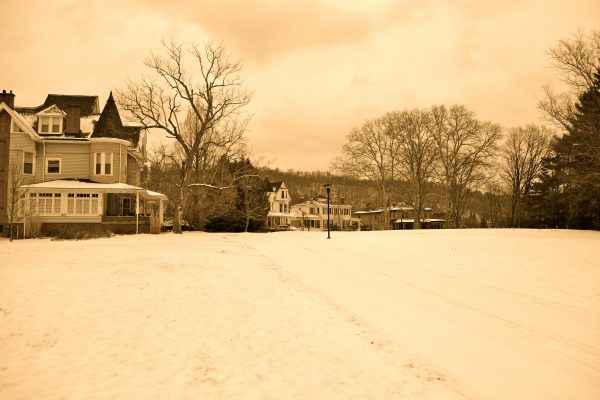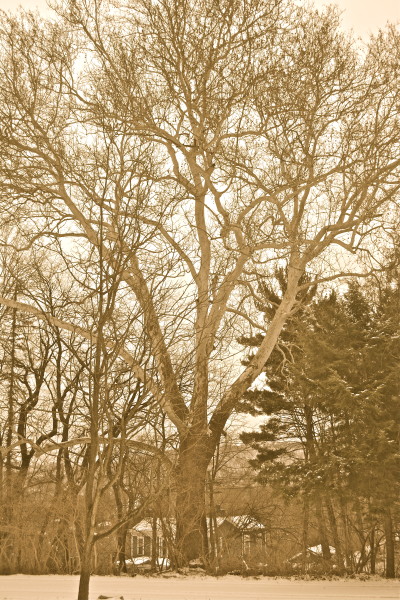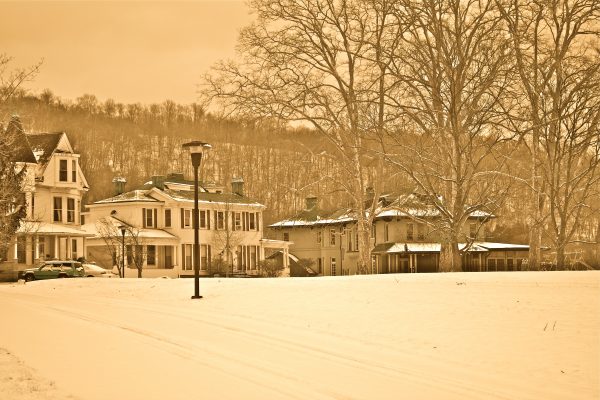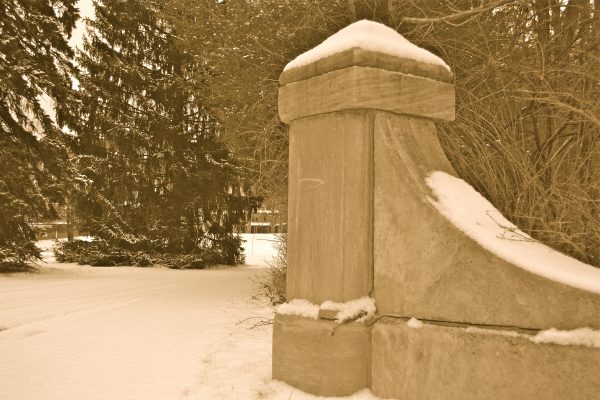By Bill Hogan
Weelunk Contributor
Doodad and Bebe
I met Mary Ann’s grandparents when I first dated her. She lived way out in the country, and at that time the roads were a lane and a half and very bumpy although paved. Mary Ann would stay at her grandparents’ home to avoid the time-consuming drive through the country. Mr. and Mrs. Blackford had a big old Victorian home with towers and wrap-around porches situated on a spacious lawn in Echo Point Circle. This was in the late 1940s, when young ladies were expected to be “in” at a decent hour, midnight at the latest.
I remember ringing the doorbell, then being ushered into the parlor on the left-hand side of the large, high-ceilinged, center hall through the wide, opened pocket doors. I was introduced to to Mr. and Mrs. Blackford. He was a big man in height and girth, dressed in a suit with the coat open displaying a vest with gold chain traversing across the expanse of his stomach from pocket to pocket connecting, I assumed, a fob to a pocket watch. He sported a large walrus mustache on a handsome old face and wore no eye glasses. He was seated in an armchair with a reading lamp on one side of his chair and a small end table for his reading material on the other. Mrs. Blackford was seated in a rocking chair next to a round table located in the center of the large room. She seemed petite, dressed in a dress with her shoulders covered by a shawl. They appeared to be the quintessential Norman Rockwell grandparents.
Mr. Blackford responded to the introduction by calling me “Bud,” which he continued to do for the rest of his days, and asked me to sit down. Mrs. Blackford was very sweet and asked if I would have something to eat or drink. We were making polite conversation waiting for Mary Ann to make her entrance from the upstairs when Mrs. Blackford asked me if I minded if she smoked. An odd question, I thought as I replied no, of course not. From under her shawl a cigarette appeared which she placed in her mouth and a kitchen match followed in a wide arc which she struck on the bottom of the rocker seat then up to light her cigarette. This display of feminism long before the word was coined stunned me.
As the months passed and I became a regular picking up Mary Ann, they never ceased to surprise and entertain me. I completely overcame being intimidated and looked forward to the Bebe and Doodad show. She would say something to me, and Doodad, who had a hearing problem, who would then exclaim, “What did you say, dear?” She would shout a reply with a smile and say ”Nothing, dear,” followed by a comment to me in a conversational tone: “The old fool is as deaf as a stone.”
The big old house was built of wood and seemed to creak all the time. There was one large fireplace, I remember, that was elaborately decorated by an ornate wooden mantle and colored tiles surrounding it, as well as the hearth. There was a large three-sided rectangle “bumper” made of a number of short brass columns on a brass base that supported a leather bench-like seat that guarded the fireplace. Mary Ann eventually took this and placed it at the fireplace in our living room. It always signified to me the tailor-made craftsmanship that went into those old mansions of another era. There was a large oil painting over the fireplace in the dining room showing a group of cavaliers at a table leaning into a conversation with faces illuminated by a lantern. When the light for the painting was on, it lit the faces and made them lifelike.
It was the first example I saw of trompe l’oeil.
Mary Ann’s first cousin, Jimmy Gilleland, had a bedroom that was just exactly as he had left it when he went off to World War ll, where he died in combat in the Philippines. He was one of the golden boys we lost. I remember the felt pennants with the college names sewed on still hanging on the walls, the football powerhouses of the day, the Princeton Tigers and so on.
He and his brother Brady, who ended up a classical scholar and dean at the University of Vermont, and their mother, Catherine, came to live with her parents, the Blackfords. This was after the father, her husband, died from “measles” as a result of “too much” of the roaring twenties. Aunt Cat, who was loved by all, could never shake her own addiction perpetuated by the Scottie and Scott glory days. They had a distinguished family history. George Blackford was a highly respected attorney originally from Findlay, Ohio, who practiced in Martins Ferry, Ohio. There was a Medal of Honor winner from the Civil War who stole a train and raided the South. I believe there was a movie made of it. Looking back, it was apparent that they lived in “genteel poverty,” probably quietly supported by their son-in-law and Catherine’s brother-in-law, Andy Hess.
Whenever George Blackford drove to town, he exited the gates from Echo Point directly into traffic on National Road, the main and only highway to Wheeling, without stopping or slowing the car. He laid on the horn to warn them.
It was a hot and muggy summer night before air-conditioning, and Mary Ann and I had returned to the big old house after a date. Everyone had retired for the night, so I was invited in, and we sat on the sofa in the parlor on the right (the one for guests). The sofa sat with its back to the center hall. The only light was a night light in the center hall to light that room as well as the stairs to the second floor. This was the era when young ladies saved themselves for marriage, and girls who didn’t were considered fast if you liked them, or trash if you did not. So there was a lot of heavy necking that often led to exploratory hands. We were going at it hot and heavy when Doodad appeared in the center hall in his underwear reading his Christian Science prayer book.
As I said, it was very hot, so Doodad had come down to the kitchen for cold water and was walking a circle through the house, center hall, dining room, kitchen, left parlor then into the center hall reading along the way. Since he was “deaf as a stone” he didn’t pick up any sounds from us. Of course we became terrified, because now it was very late, and our conduct would be unexplainable in the context of proper and decent behavior. I will never forget the two of us peeking over the back of that couch to time how long it took for Doodad to complete the circle of rooms. We timed his route with my wrist watch lighted with matches. (We all smoked cigarettes.) After we carefully established the time of his circuitous path, we waited until he exited the hall into the dining room and then Mary Ann darted for the stairs and I for the front screen door. Luckily, since he couldn’t hear, we made good our escape and Mary Ann’s reputation was preserved, and I was not banished from the Blackford house.
They are all gone now: the players, the hot sweaty nights before air-conditioning, the wooden porches with the wicker furniture, the heavy, wooden screen doors, the house, and of course the sweet innocence.
Photos by LeeRoy


